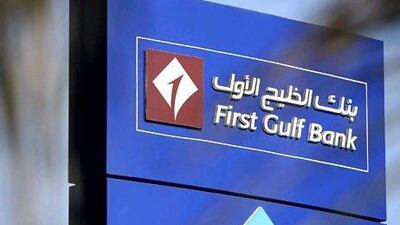First Gulf Bank (FGB) shrugged off the Central Bank's moves to regulate excessive lending charges to beat analysts' expectations with second-quarter profits.
Although its income from fees was clipped back, the effect was muted by a boost in revenue across the board.
FGB, the UAE's second-biggest lender by market capitalisation, reported profits of Dh890 million (US$242.2m) for the second quarter, an increase of 13 per cent on the same period last year.
Analysts polled by Bloomberg News had expected profits of Dh820m.
But FGB's income from fees for the same period plunged 18 per cent to Dh291m as the impact of the Central Bank's regulations took effect, capping loan fees and the amount banks could lend to individuals.
The bank said reduced income from fees and commissions was "mainly due to regulatory changes in retail lending implemented recently by the UAE Central Bank", which came into effect on May 1.
The Central Bank's move to combat excessive fees and charges is expected to result in a change in strategy for lenders in the UAE that have large retail banking businesses, such as FGB.
However, the UAE's improving economic performance and declining number of bad loans has helped FGB escape a bigger hit to its profits, said Andre Sayegh, the bank's chief executive.
"These numbers are a reflection of solid balance sheet management by FGB," he said.
The bank also signalled expansionary moves following job losses in recent years.
FGB would seek to "cultivate our organic expansion, [build] up our existing international offices and branches and expand our geographical footprint", Mr Sayegh said.
The bank laid off 62 staff between December and March, according to a recent bond prospectus.
Lending was subdued, affected by limits on personal indebtedness preventing instalments on loans from exceeding half of an individual's total monthly income.
Net loans and advances rose 1.5 per cent to Dh98.6 billion during the second quarter, while deposits increased 1.9 per cent to Dh100.4bn during the same period.
Non-performing loans fell and now account for 4.3 per cent of the bank's loan book, down from 4.6 per cent in March.
Benchmark interbank rates, known as Eibor, fell during the quarter to record lows, allowing the bank to squeeze more revenue out of its lending.
Despite the slow lending growth, net interest and Islamic financing income rose 17 per cent to Dh1.22bn, counteracting the loss of fee income.
Although the bank had been able to maintain its margins, the true test will be whether it can maintain profitability in the coming year as the new regulations take effect, said Tarik El Mejjad, a financial analyst at Nomura.
"Net interest income is still good - that lets you know that margins haven't fallen yet because of the retail banking circular," he said. "But fees are really down due to these retail [regulations]."
The bank's ability to find new lending sources outside of its retail business might also present problems unless economic growth improves substantially, Mr El Mejjad added.

